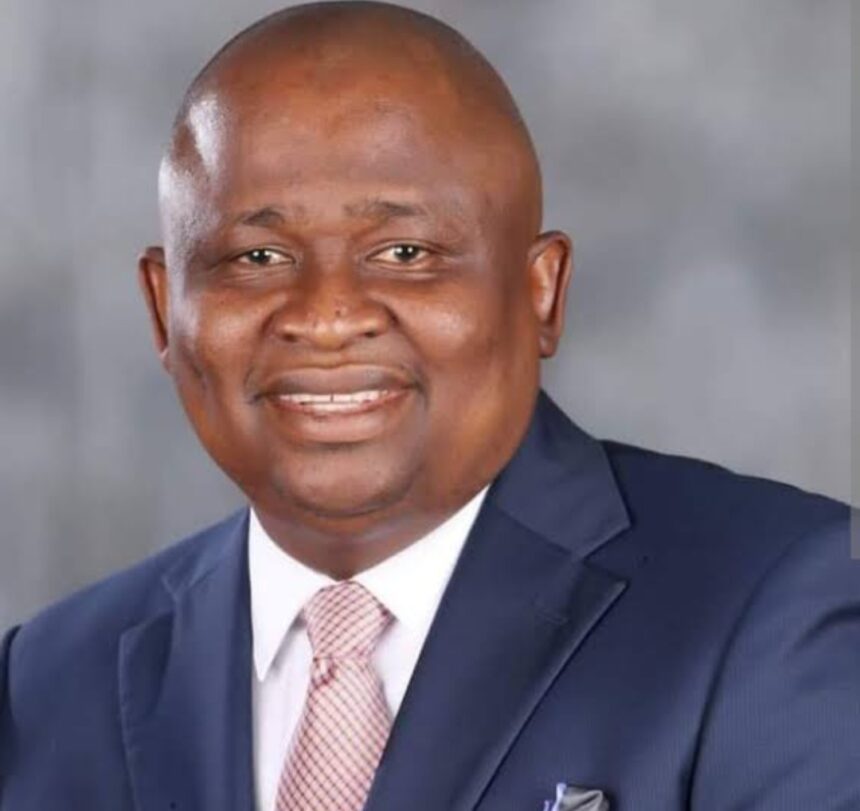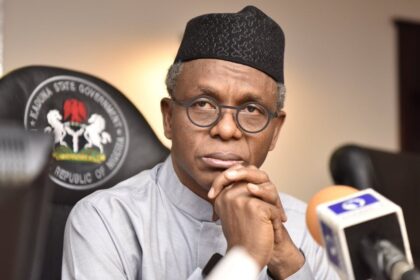There are men who dream of light, and there are those who strike the match. In Ogun West, one name burns through the horizon as the quintessential lightbearer: Senator Solomon Olamilekan Adeola Yayi. Across Ogun West, his name drifts like dawn over rooftops newly kissed by power and markets empowered with grants. Yayi coasts through the landscape, towering as the most prized candidate en route to the Ogun 2027 guber race. But, before the campaign songs began, his work had already become music; before the ballot talk, his deeds had begun to speak. Today, in Ogun West, over 102 transformers powers the remotest parts of his constituency: roads unfold through towns once forgotten and markets pulse with promising commerce. Thanks to Senator Yayi; about 250 constituency projects birthed on his watch, stand like milestones of stately intent. His rhythm is that of a builder who finished the bridge before the crossing began, writes KAYODE ALFRED
Every generation births a hero whose pulse syncs with the present and tomorrow. There is such a hero in Senator Solomon Olamilekan Adeola, Yayi. In his hands, Ogun takes to brilliant forms of tomorrow. Go to Ogun West, Yayi’s name resounds with unfeigned conviction. His story unfolds in slogan and concrete, amid the quiet hum of progress birthed on his watch. Across towns and villages, from Ilaro to Ado-Odo, the scent of new roads, the laughter in lit markets, and the chatter of hope beneath tin roofs tell of a man who built before asking to lead.
The race toward Ogun 2027 quickens, and the air grows electric with speculation and strategy. Yet among the crowd of aspirants, Yayi moves differently; grounded and deliberate. He campaigns with projects, not promises; and he speaks through transformation, not theories, unlike too many of his peers. Every initiative carries the clarity of one long prepared, one who understands that leadership is not a sudden ascent but a long apprenticeship to service.
There is no gainsaying the map of Ogun West now glitters with the geometry of Yayi’s deeds—over 250 constituency projects birthed across the senatorial district like cornerstones on an ancestral land. Each project manifests as a pulse in the state’s developmental heart. Schools rise where bush once ruled, health centres bloom where neglect once lingered, and farm roads, newly tarred, now carry the scent of commerce instead of dust.
Yet, Yayi’s interventions are rid of the emptiness of political tokenism. Over 40,000 lives have felt the tangible imprint of his empowerment crusade: students with scholarships, traders with capital, artisans with tools, and farmers with equipment. Beneath his schemes, hope is practical, not theoretical; it takes form, with names, faces, and receipts of change.
When he embarked on his August 2025 commissioning tour, it was not the parade of a man seeking applause. It was the homecoming of a builder inspecting his edifice. Ninety projects unveiled across five local governments—roads, markets, school blocks, and healthcare centres—all designed to touch daily life where it hurts and heal it where it matters.
There is something sacred about bringing light to darkened homes. When Yayi unveiled the “Light Up Ogun State” initiative, distributing 102 transformers across communities, it was as if dusk itself lost authority. Small businesses found longer days; markets grew safer; children studied under white bulbs instead of candle smoke. The gesture was both practical and poetic; an act of illumination that transcended electricity, symbolizing the rekindling of communal confidence.
Each transformer beamed like a monument to faith in the ordinary Nigerian dream; that a man’s place of birth need not dictate his access to amenities. As wires hummed to life in remote hamlets, the senator’s message traveled wordlessly: governance can still mean service; politics can still glow with purpose.
Beneath Yayi’s calm and often understated mien lies a deliberate philosophy: empowerment as renewal, not ritual. His brand of empowerment surpasses random ceremony; it births entrepreneurs, sustains livelihoods, and reorients the moral economy of survival. To the widow who received a trade grant, to the young farmer handed mechanized tools, to the schoolgirl whose tuition was paid, his name translates to possibility.
Yayi sees empowerment as the preface of independence, a way of reordering life’s script so that dignity replaces dependency. The result is a growing league of citizens who bear his story as their own, and see their upliftment as evidence of what governance, if rightly practiced, can become.
Yayi’s political sojourn, no doubt, embodies the most inspiring narrative of growth. Before ambition, there was apprenticeship; years of legislative refinement, financial stewardship, and constituency engagement. From Lagos to Abuja, he learned the ropes of governance, honed the discipline of delivery, and built the networks that now contour his strength.
By the time the medley of Ogun 2027 began to stir, his blueprint was already drawn. Grassroots movements like the Progressive Change Agent Initiative (PCAI) had begun aligning in his orbit, mobilizing across the 20 local government areas, reawakening ward operatives, and reengineering voter engagement. Their faith rests sprouted on visible evidence, not future promises; what they have seen, touched, and measured.
In communities like Aboro, Ifo, and Ado-Odo, Yayi’s endorsement is organic. Chiefs, market women, youths, and elders chant a single refrain: “Yayi delivers.” To them, the argument for his governorship writes itself. His footprints predate his bid. He has sown where others intend to promise. The bridge between trust and leadership already stands.
While campaigns often reek of desperation and noise, Yayi’s movement breathes credibility. His advance toward the APC ticket bears the calm assurance of earned worth. The narrative of his aspiration is sculpted by proof, not propaganda. Every school roof he raised, transformer he installed, and market he built, contributes to his legitimacy.
Observers say his greatest strength lies in momentum, not in money or machinery. It is an accumulated trust that grows with each project completed. Yayi’s campaign is powered by gratitude, not grievance; by evidence, not emotion. And in the competitive equation of Ogun politics, that distinction counts deeply.
Yet, there is so much to applaud about Yayi’s human core. Behind the political calculus beats a human heart shaped by empathy. Yayi’s philosophy of leadership flows from lived humility and parental instruction. He often recalls lessons of industry and generosity honed into his upbringing. Those who know him describe a man uncorrupted by privilege, one who approaches power as a duty rather than an inheritance.
His public engagements carry a disarming warmth. He listens and lingers. He also remembers faces and names. To communities long accustomed to absentee politics, that attentiveness feels revolutionary. To the youth, it offers a model of leadership grounded in humanity rather than hierarchy.
Across Ogun West, the stories converge: a senator who attends to village boreholes without cameras; who answers calls from traders at dusk; who funds medical outreach without press releases. The gestures, though unsung, seed something rare; a culture of authentic governance.
A closer look at his developmental pattern reveals an builder’s precision. His interventions are not scattered acts of charity but pieces of a coherent vision: education feeding into empowerment, empowerment powering enterprise, enterprise sustaining community renewal. Schools become the seedbeds for future entrepreneurs; markets become the lifelines for households; electrification becomes the engine of commerce. Each initiative links to another in a seamless choreography of progress.
There is no gainsaying that Yayi envisions Ogun West as a hub of productive citizens, a zone where infrastructure, education, and agriculture fuse into a self-sustaining ecosystem. Thus, across the senatorial landscape, the air thickens with awakening at his emergence in the political space. Youth groups convene spontaneously to pledge allegiance. Elders host twilight meetings where history and hope commune. Even opposition voices concede that Yayi has shifted the tempo of expectation. His consistency has blurred the old divide between skepticism and belief.
Grassroots structures once dormant now hum with civic energy. The voter registration drives spearheaded by PCAI have turned political mobilisation into a social renaissance. Conversations in beer parlours and markets circle around the same refrain: “He has done well; let him go higher.”
Such consensus is rare in a polity marred by distrust. Yet Yayi’s ascent seems to mend every fissure with credibility. His politics of performance has become a quiet revolution, an awakening of faith in the possibility of honest leadership.
As 2027 approaches, the script of Ogun’s political future is written as an action-packed matinee. Yayi’s readiness is, however, scarcely rehearsed; it is fully lived. The groundwork he has laid extends beyond infrastructure into the psychological roots of the people. Trust has become his capital, and delivery, his most effective campaign.
No doubt, when the people look back in history, many would find that Yayi’s greatest gift to Ogun was not the hundreds of projects or the thousands of beneficiaries, but the redefinition of what it means to serve. He has turned governance into a verb of compassion, an art of visible empathy.
Each era finds its builder; the one who shapes the bridge between what is and what can be. Yayi stands at that bridge, steady as a craftsman, patient as a farmer awaiting harvest. His preparation has met its season; his readiness has matured into inevitability. From the red dust of Ogun West to the corridors of power in Abeokuta, the murmur grows louder: a dawn approaches, and its designer has a name.
When the ballots open and the people choose, the moment may simply affirm what has long been evident, that Senator Solomon Olamilekan Adeola Yayi, did not wait for power to define him. He defined power by serving first.




